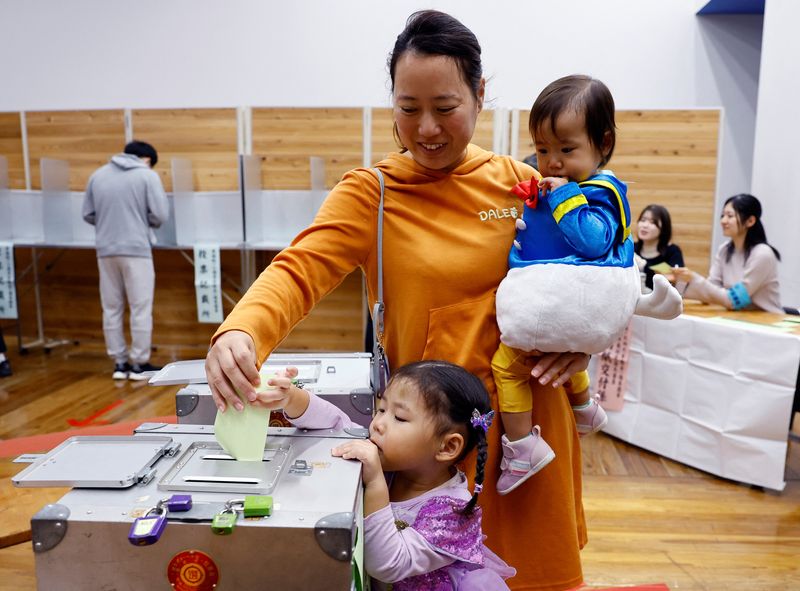By Brigid Riley and Kevin Buckland
TOKYO (Reuters) -The yen fell to a three-month low and Japanese stocks were set to decline on Monday after Prime Minister Shigeru Ishiba’s coalition lost its parliamentary majority in a drubbing in Sunday’s election, raising uncertainty over the path for policy and the economy.
With all but 20 of the 465 seats accounted for, Ishiba’s Liberal Democratic Party (LDP), which has ruled Japan for almost all of its post-war history, and junior coalition partner Komeito took 209 seats in the lower house of parliament, public broadcaster NHK reported. This falls well short of the 233 needed for a majority. They previously held 279 seats.
The outcome may force parties into fractious power-sharing deals to rule, potentially ushering in political instability.
The yen sank, with the dollar last trading 0.48% stronger at 153.12 yen. It earlier reached 153.30 yen for the first time since July 31.
share average futures declined to 37,605, compared with a close for the cash index of 37,913.92 on Friday.
The prospect of the scandal-plagued LDP losing its standalone majority put Japan’s financial markets on edge leading up to the election. Fears heightened as opinion surveys in the run-up to the vote indicated the coalition itself might lose its majority.
“The political uncertainty from the election outcome may negatively affect investors’ sentiment, putting pressure on the markets in the near term,” said Samuel Hoang, a portfolio manager for Japan funds at Eastspring Investments in Singapore.
A minority coalition in particular would draw market attention to the policy stance of opposition parties that could become potential partners, many of which favour low interest rates. Markets could also price in more aggressive government spending.
“If they want to show good teamwork, they need to spend more,” said Shoki Omori, chief Japan desk strategist at Mizuho Securities. “Fiscal policy is going to come first – that’s where the focus is going to be, and I think it’s going to need to be a big one.”
Ishiba, in office just a month, had set his sights on the coalition keeping the 233 seats needed for a majority in the lower house, down from the commanding majority of the LDP’s 247 seats plus Komeito’s 32.
Coalition losses could reduce the chance the next government will implement “more challenging agenda items such as hiking the corporate tax rate”, analysts at Morgan Stanley said in a note.
That political uncertainty pushed the benchmark Nikkei share average down 2.7% last week. Longer-dated Japanese government bond yields climbed on worries of a bigger government fiscal deficit. [JB/T]

Analysts at BNY expect the dollar could potentially rise to 155 yen again, as the Bank of Japan downplays the immediate need for a rate increase and the Japanese election risks stoke additional political instability.
Japan’s general election comes nine days before votes are counted in the closely contested U.S. presidential race, with investors weighing the possibility of a bullish dollar and higher yields in the event of another Donald Trump presidency and Republican sweep of the Senate and House of Representatives.
(Reporting and writing by Brigid Riley and Kevin Buckland in Tokyo; Additional reporting by Vidya Ranganathan in Singapore; Editing by William Mallard and Lisa Shumaker)


